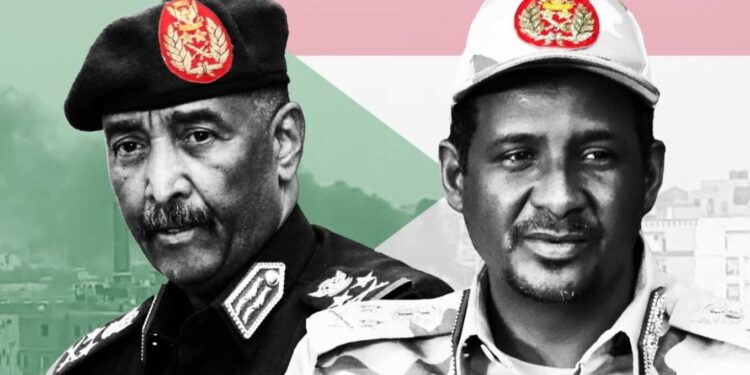By John Ikani
Sudan’s Army and paramilitary Rapid Support Forces (RSF) have reached an agreement to extend the fragile cease-fire that has been in place amid their battle for control of the country.
The decision follows the expressed impatience of two key international mediators in response to persistent violations of the truce.
Late on Monday, Saudi Arabia and the United States jointly announced a five-day extension of the cease-fire between Sudan’s warring sides.
The joint statement highlighted that the extension aims to provide an opportunity for further humanitarian assistance, restoration of essential services, and discussions regarding the possibility of a longer-term extension.
The recent development came after both Riyadh and Washington specifically criticized the warring sides on Sunday, for their breaches of the weeklong truce, which was initially set to expire on Monday evening.
Rather than issuing a generalized appeal to respect agreements, the mediators chose to hold the parties accountable for their actions.
Sudan has been engulfed in chaos since mid-April when clashes erupted between the military, led by Gen. Abdel-Fattah Burhan, and the RSF, commanded by Gen. Mohammed Hamdan Dagalo.
The violence has led to the loss of countless lives, with at least 866 civilians killed and thousands more wounded, according to the Sudan Doctors’ Syndicate.
However, the actual toll could be significantly higher, as acknowledged by the medical group.
The conflict has transformed Khartoum, the capital, and other urban areas into battlegrounds, resulting in the displacement of nearly 1.4 million people.
Many have sought refuge in safer regions within Sudan or have crossed the borders into neighbouring countries.
At the outset of the unrest, foreign governments swiftly evacuated their diplomats and citizens, while numerous foreign residents scrambled to flee the nation.
Over the past weeks, the United States and Saudi Arabia have been engaging in mediation talks between the military and the RSF in Jeddah, a Saudi port city.
Thus far, seven cease-fires have been declared, all of which have been violated to some extent.
In their Sunday statement, both the United States and Saudi Arabia called attention to the military’s ongoing airstrikes and the RSF’s occupation of civilian homes and seizure of properties.
The theft of fuel, money, aid supplies, and vehicles belonging to a humanitarian convoy was also highlighted, occurring in areas controlled by both the military and the RSF.
Alan Boswell, project director for the Horn of Africa at the International Crisis Group, explained that the joint statement was an attempt to exert pressure on both sides to adhere more strictly to the cease-fire.
He noted that the mediators are currently lacking an alternative to the Jeddah talks and emphasized the need for a stable cease-fire to pave the way for a broader political process to resolve the conflict.
Kholood Khalid, a Sudanese analyst with the Confluence Advisory think tank, suggested that the mediators’ focus has shifted towards negotiating an agreement for a cease-fire that would facilitate the resumption of the political process.
However, she expressed scepticism due to the absence of consequences for cease-fire violations and the continuation of flawed mediation strategies.
The conflict in Sudan has reached a stalemate, with neither side able to deliver a decisive blow.
Residential areas in Khartoum, Omdurman, and Bahri have witnessed widespread destruction, with reports of paramilitary troops storming and looting homes.
Many affected individuals took to social media to condemn these acts allegedly committed by the RSF.
Aid group offices, healthcare facilities, and other civilian infrastructure have also been targeted and looted.
Since the onset of the conflict in mid-April, numerous hospitals have become inaccessible.
Reports have surfaced regarding instances of sexual violence, including the rape of women and girls in Khartoum and the western Darfur region.



































